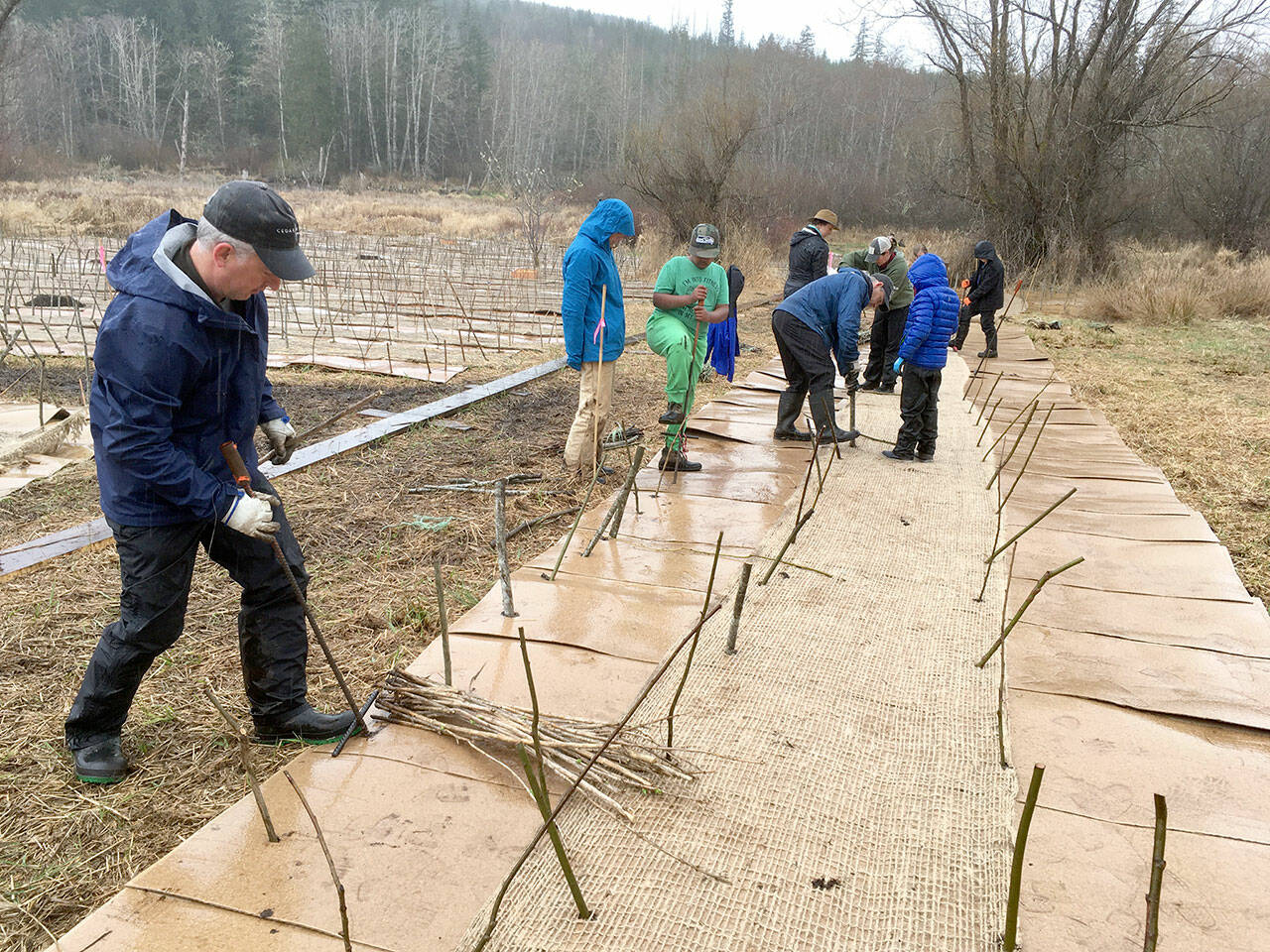QUILCENE — Intrepid volunteers from three area schools braved a soggy 16th annual Plant-A-Thon to plant 1,200 native plants along Tarboo Creek, the Northwest Watershed Institute reported.
The volunteers on March 19 shared the same goal as those who have worked on this annual project since 2005: to help restore native salmon and wildlife along the creek, said Jude Rubin, director of public engagement for the Northwest Watershed Institute, (NWI) in a news release.
Plant-A-Thon, the largest service learning fundraiser on the North Olympic Peninsula, has in past years involved up to 200 volunteers planting 6,000 trees in a day. However, in 2021 and 2022, the event was scaled down to allow smaller groups to plant at appropriate distance, due to the COVID-19 pandemic, Rubin said.
This year’s Plant-A-Thon welcomed 40 volunteers to the headwaters of the Tarboo Watershed. Student volunteers and their families helped restore native vegetation to the wetlands and tributaries that drain directly into Tarboo Creek.
Longtime NWI partner Leigh Heron, the owner of Trillium Woods Farm/Concerts in the Barn, allowed volunteers to access the adjacent planting site, which had been logged more than 100 years ago for pasture. That area has since grown back as a solid patch of reed canary grass, a highly invasive species.
Walking along plank walkways donated by Carl’s Building Supply and Pacific Northwest Timbers, volunteers made their way through the rain and tall grass to the planting site.
At the introductory circle, Rubin, as Plant-A-Thon coordinator, explained the ecological background for planting, acknowledged native tribal occupation of the site and noted that restoring past damage to land “is the work of our time.”
The group split into three zones. Older students headed for areas covered in reed canary grass while younger students and their families went to the higher ground to plant myriad species of bare-root and potted plants.
Teen crew leaders Hailey Gallagher from Port Townsend High School and Trillium Burbank from Chimacum High School detailed the planting techniques to the multi-age volunteers, who then worked through intermittent rains from 10 a.m. to 2 p.m. at the restoration site along Center Road in Quilcene.
“The reed canary grass makes this a daunting site to replant because the native trees planted in the usual way can’t compete with 6-foot-high growth grass and a solid mat of roots,” said Peter Bahls, NWI’s executive director.
In 2007, NWI pioneered a successful approach to removing reed canary grass.
Large overlapping sheets of cardboard donated by Sheets Unlimited covers the invasive grass to smother it. The volunteers stab the cardboard every few feet with dormant live plants stakes such as willow, twinberry and ninebark that root spontaneously when planted in perennially wet areas.
The following year, these wetland shrubs shade out the reed canary grass. Eventually, NWI plans to over-plant with such conifers as Sitka spruce.
The strategy is labor-intensive and requires transporting thousands of sheets of 4-foot by 8-foot cardboard, plants and other materials, Rubin said.
This was completed before the Plant-A-Thon by NWI’s professional restoration field crew led by Wesley Meyers.
Many volunteers said they enjoy returning annually to see how their trees have grown, with families treating it as a tradition they celebrate like other holidays, Rubin said.
“I would never miss this event. It just makes me so happy,” said Virginia Grace, an English teacher at Port Townsend High School who attended Plant-A-Thon with her son.
“For me, Plant-A-Thon is better than Christmas.”
While stabbing live stakes into the ground with his own son, Swan School teacher Mike Galligan said several of his fifth-grade students were attending their seventh or eighth consecutive event, having started planting trees when they were 4.
Some participants, like Elisabeth and Ben Heiner, dedicated their trees to the memory of family members.
The restoration work is part of a much larger project that included NWI’s purchase of three adjoining properties along the upper Tarboo Creek totaling 14.5 acres for permanent conservation of fish and wildlife habitat, Rubin said.
Support for the land acquisition and restoration work came from the state Department of Fish and Wildlife’s Aquatic Land Enhancement Account, U.S. Fish and Wildlife Service, Port Gamble S’Klallam Tribe, Taylor Shellfish Company, Pope Resources, Jefferson County Conservation Futures Program, the state Department of Ecology, the Port Townsend Food Coop and private donors.
Plant-A-Thon school coordinators Scott Clifton (OCEAN), Viola Frank (Chimacum High School), Mike Galligan and Bonnie White (Swan School), as well as volunteer tree planters and crew leaders from OCEAN and Swan Schools, and from the Chimacum Interact Club, all have chipped in on the project over the years.
As in past years, schools will offer Tree Cards for sale. These allow the buyer to send a card that plants a tree in honor or in memory of someone special.
To purchase cards in time for Earth Day or Arbor Day, contact Swan School or OCEAN.
All proceeds from the sale of Tree Cards goes to the schools.
To support the Plant-A-Thon event and other youth-led restoration events, contact Northwest Watershed Institute at www.nwwatershed.org

